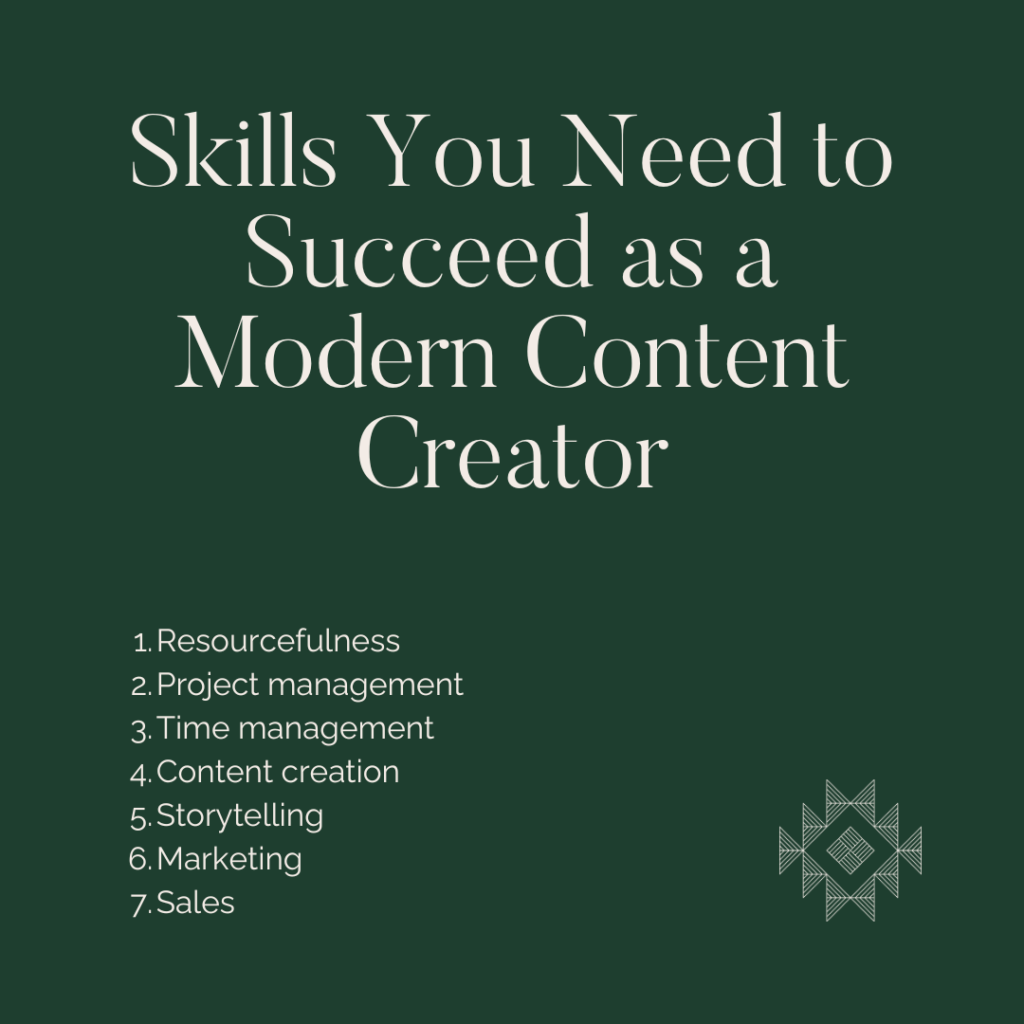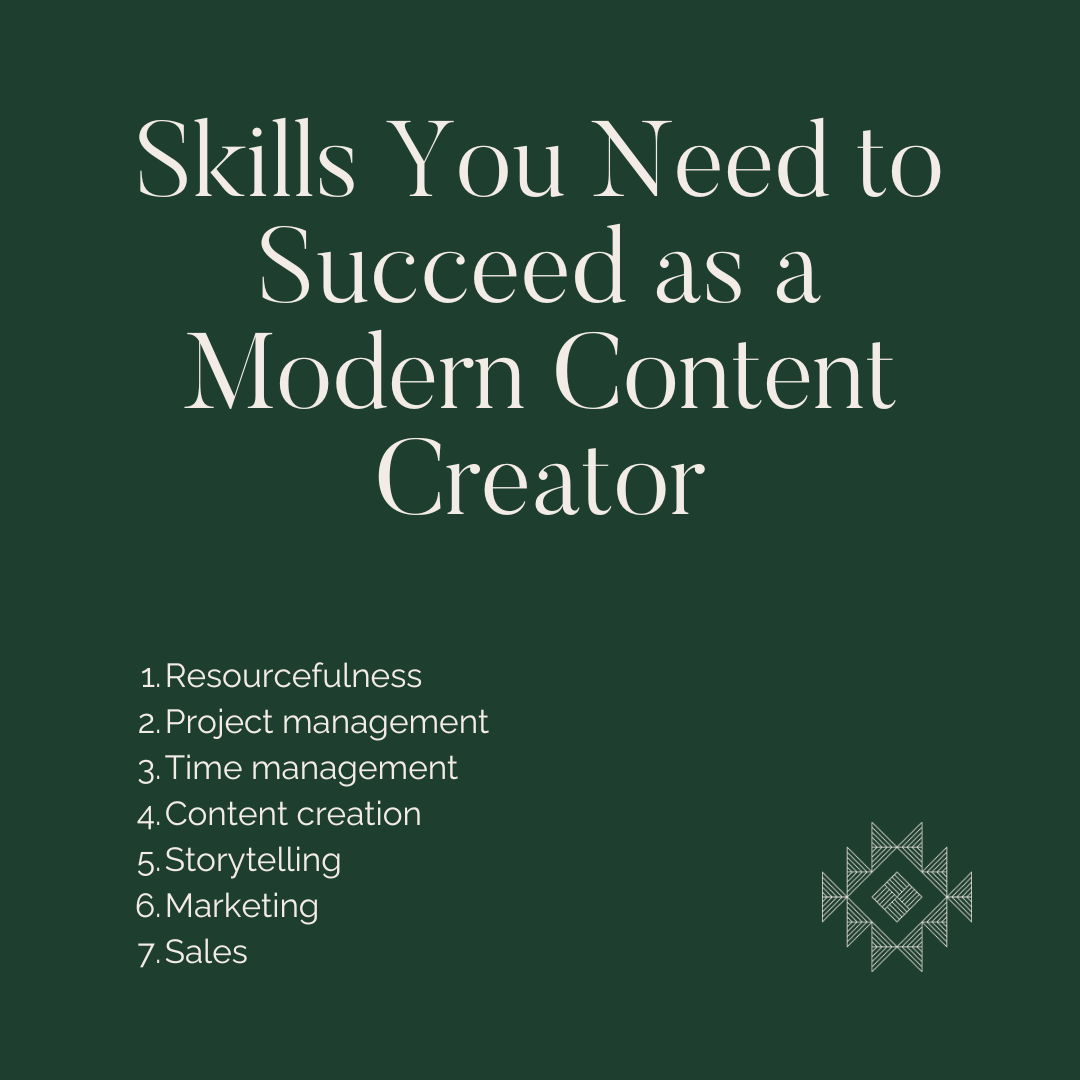The role of a content creator is nothing less than multi-dimensional. Most of the time, it will require you to wear multiple hats:
- Content planning
- Content management
- Content development
- Content creation
- Content writing
- Content producing
- Content editing
- Storytelling
- Audience engagement
- Brand strategy and development
To make a significant impact, creators must weave a cohesive narrative across different platforms, understand their audience, and improve their skills.
Let’s break down the seven most important skills you’ll need to succeed in the digital age.
1. Resourcefulness
Adapting and making the most of what you have is a key skill. This applies not only in the digital platforms but also in real life.
Not all content creators have big budgets. Being resourceful allows you to create high-quality content with limited resources:
- Use free or low-cost tools for different tasks, such as:
- Content creation – Canva, CapCut
- Project management – ClickUp, Notion, Trello, Asana
- Content scheduling – Meta Business Suite, Metricool
- Collaborate with others to reach larger audiences
- Guest blogging
- Podcast interviews
- Joint webinars
- Repurpose content to save time and prevent creative burnout.
- Crowdsource ideas
- Go to askthepublic.com
- Search trending topics and pop culture on TikTok and Twitter
- Ask your audience what they want to know.
2. Project Management
You must be an effective project manager to streamline content creation from ideation to publishing.
Set realistic goals and timelines to avoid last-minute rushes, overwhelm, and creative burnout.
Use systems and tools to track your progress and maintain organized workflows. James Clear, the author of Atomic Habits, once said, “You do not rise to the level of your goals. You fall to the level of your systems.”
I use ClickUp to automate task workflows and delegate assignments to my team members. Then Notion to organize my thoughts and brainstorm ideas.
It took me almost two years to streamline my processes and workflows. And it’s worth it. My clients and I have saved at least 10 hours each week by automating workflows.
To improve your project management skills:
- Invest time learning project management tools that complement your work style, such as ClickUp, Asana, or Trello. You can start with Google Sheets.
- Develop detailed project plans with milestones, deliverables, and deadlines before starting.
- Watch free tutorials on YouTube to enhance your knowledge. You can also take online courses to add to your credibility.
Learn as you go. What works for others may not work for you.
3. Time Management
Balancing content creation with other responsibilities can be draining. Practical time management skills allow you to:
- prioritize tasks
- eliminate distractions
- optimize your workflow
without compromising content quality.
Use calendars, to-do lists, time blocking, and project management tools to schedule tasks, prioritize high-impact activities, and plan realistic timelines.
Group similar tasks, like filming, writing, or reviewing, to minimize context switching.
Remove distractions. Turn off your phone or put it in a different room. If you’re creating content on your phone, turn off notifications.
Use scheduling and automation tools for repetitive tasks. These are the tools that I use:
- Metricool – for scheduling social media posts
- ClickUp – content management system and task delegation to team members
- Notion – second brain
If you can, delegate or outsource.
Life happens. Be flexible with your schedule. Learn to say “NO” to non-essential commitments and prioritize based on current circumstances.
4. Content Creation
It may seem redundant to say a content creator needs to learn content creation, but it is what it is. To succeed as a modern content creator, you need to understand the entire lifecycle of content creation, from idea inception and creation to publishing.
Consume different types of content to understand what resonates with you and your audience.
Take courses or workshops on specific skills like writing, editing, graphic design, or video editing. You don’t have to master these skills all at once. For example, you can be a writer with basic video editing and graphic design knowledge.
Develop a keen eye for detail to identify areas for improvement and refine your content.
Keep practicing and try to experiment with different formats and styles. Get feedback from others and learn from their perspectives.
5. Storytelling
Facts and figures are important, but people remember stories long after they forget dry information. With AI tools and easy access to information, anyone can be a content creator.
Create a strong foundation for your story by knowing your why. What motivates you? What are the things you’re passionate about? What things did you learn that others can learn from, too?
Be different by using your story. Share your experiences, challenges, and successes to make your content relatable and authentic.
Find the right story for the right format when weaving your story into your content marketing.
6. Marketing
Great content needs the right audience.
You may keep sharing your content, but ’s like building a beautiful house without a door or windows. if you don’t market themThere’s no chance for opportunity.
Learning and applying marketing principles can impact your success. So here are some resources:
- Platforms like Coursera, Udemy, and LinkedIn offer courses on Digital Marketing.
- There are countless marketing books covering marketing topics. A popular choice and personal recommendation is “This Is Marketing” by Seth Godin.
- Follow marketing blogs and websites like HubSpot, CopyBlogger, Moz, and Social Media Examiner. Many YouTube channels offer tutorials and tips for content creators of all levels.
Marketing through your content is the key to building awareness for your brand, promoting your offers, and nurturing your online community. Use email lists, social media groups, and other tools.
Start by learning about target audience analysis, social media platforms, content marketing strategies, and basic analytic tools.
Then, set clear goals for your content marketing and track your progress.
Focus on building your community before considering paid advertising to reach a wider audience.
Partner with other content creators in your niche to cross-promote each other’s work and expand your reach.
7. Sales
While marketing is focused on building awareness and creating interest in your brand, product, or services, sales aims to convert your audience into buyers.
“But, Nicole, that’s kinda crass if you put it that way.”
Yep, me too. My mindset was, “I don’t want to learn sales because I don’t want to be a scamming, pushy, slimy, and sleazy saleswoman.”
It doesn’t have to be that. Selling your services doesn’t have to make you uncomfortable. And if you know you’re coming from a place of help, you will be confident to offer your product or services.
Just because you’re selling and sharing something does not mean you’re trying to exploit your audience.
Selling hinges on building trust and rapport with potential customers. Having sales skills will help you engage and connect with your audience.
Top salespeople understand what their customers want and need. It means knowing how to articulate your message to help your audience determine if your offer is good for them.
Tips to hone your sales skills as a content creator:
- Identify your value proposition. What unique value do you offer your audience?
- Learn storytelling. Connect with your audience on an emotional level.
- Master active listening. Pay close attention to audience feedback and engagement.
- Build a community. Interact with your audience and create a sense of belonging, inclusivity, and connection.
- Experiment and track results. Try sales techniques like calls to action, partnerships, or paid promotions.
So there you have it. The top seven skills you need to succeed as a content creator for your brand, clients, or business.

